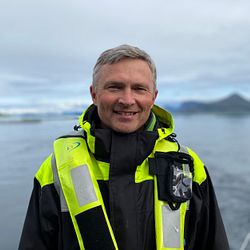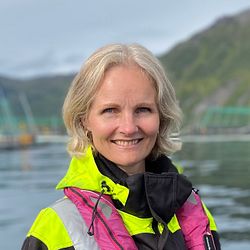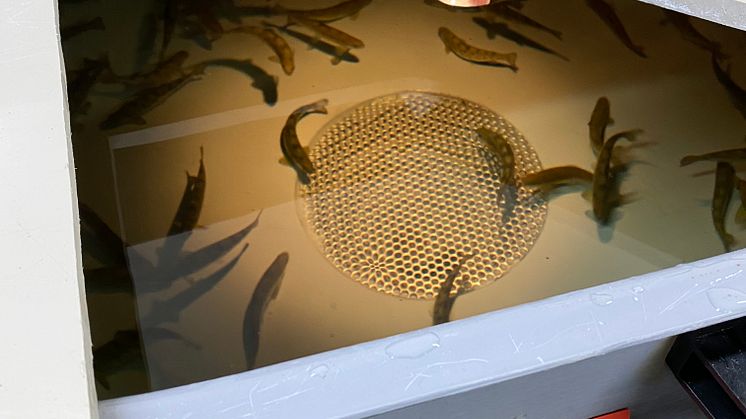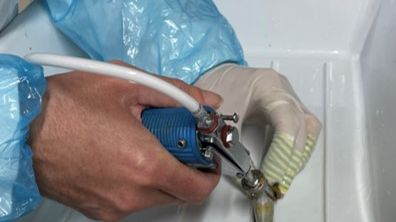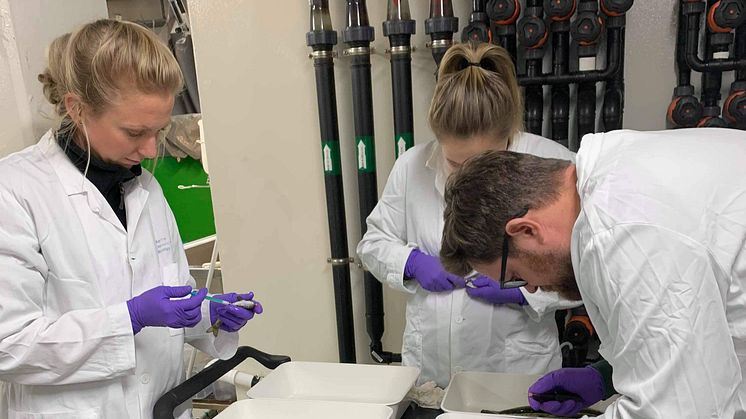
Press release -
Benchmark Animal Health and Cermaq receive funding from the Research Council of Norway for the development of Tenacibaculum vaccines for salmon
Mouth rot and tenacibaculosis represent a major issue for the health and welfare in farmed Atlantic salmon
Benchmark Animal Health, a leading aquaculture biotechnology company, and Cermaq Group AS, a world leading salmon farming company, announced receipt of NOK 4.2 million in funding from the Research Council of Norway, to support a collaborative research project to develop a vaccine against salmon diseases caused by Tenacibaculum bacteria.
The funding from the Research Council of Norway enables Benchmark and Cermaq to undertake important research evaluating and optimising novel vaccines against Tenacibaculumbacteria. The partnership couples the biotechnology and fish health innovation expertise of Benchmark with Cermaq’s extensive research on Tenacibaculumbacteria, as well as experience as a leader in aquaculture and farming. From Cermaq's side, the project will be headed by Ph.D. Sverre Småge and the researchers Cecilie Isachsen Lie and Helene Velle Mayer. At Benchmark, Sarah Barker and Sindre Rosenlund will lead the project alongside the researchers Claire Stanley, Fiona Tulloch and Matthias Winkle.
Diseases resulting from Tenacibaculum bacteria – mouthrot and tenacibaculosis – represent a major concern to the aquaculture industry in terms of both fish health and welfare issues, as well as significant economic losses due to increased mortality, reduced quality at harvest, and the need for antibiotic treatments. A preventative vaccine for these diseases would provide huge benefit for the aquaculture industry.
Sarah Barker, Senior Research Scientist at Benchmark Animal Health, said: “The research team at Benchmark Animal Health are delighted to receive this recognition from the Research Council of Norway. We are looking forward to working on this important project in collaboration with our partner Cermaq Group AS, supporting our mission to achieve the highest standards of fish welfare and support the sustainable growth of the aquaculture industry.”
Olai Einen, Global Head of Feed and Fish Health Research at Cermaq, said: “Preventive fish health is always the best option, and Cermaq invest much in preventive fish health in our dedicated fish health research team and through implementation in our operations. This joint project with Benchmark Animal Health is a great opportunity to succeed in developing an effective vaccine against the Tenacibaculum bacteria, and hence important for salmon farming.”
The Research Council of Norway is a Norwegian government agency that funds research and innovation projects. The Benchmark and Cermaq vaccine research is one of 11 projects within aquaculture, fisheries and green shipping to receive funding in 2021, totalling NOK 68 million over three years. These projects represent opportunities for green transformation, sustainable production of seafood and also digitalisation and streamlining of the maritime industries.
Notes to editors:
The impact of Tenacibaculum bacteria related diseases
Mouthrot and tenacibaculosis associated with T. maritimum and T. finnmarkense cause major economic losses to the Atlantic salmon aquaculture industry in Canada and Norway. These diseases also negatively impact fish health and welfare, increasing mortality and reducing quality at harvest.
In Norway, the Norwegian Veterinary Institute reported in 2020 that tenacibaculosis was considered the fifth most important cause of mortality in on-growing salmon, sharing third place with typical winter ulcer disease in terms of reduced salmon welfare.
In BC Canada, mouthrot typically occurs following the transfer of smolts to sea sites and can result in up to 40% total cumulative mortality in affected cages. In BC, the annual cost associated with outbreaks is estimated to be $1.8M, in addition to an estimated revenue loss of $3.8M per year to the local industry.
The Benchmark and Cermaq vaccine project
Even though there is a significant negative impact of tenacibaculosis and mouthrot on fish welfare and the salmon farming industry, there is no commercially available vaccine or preventative solution.
This project will lay the foundation for the potential of a commercial vaccine against tenacibaculosis and mouthrot, addressing unmet need. A commercially viable vaccine would have a significant impact on the sustainability of the salmon farming industry helping to:
- 1. Reduce the need for antibiotic use against tenacibaculosis and mouthrot
- 2. Enhance current productivity and reduce production costs of the sector by reducing losses to mortalities, downgrading of produce, and reduction in antibiotic treatments.
With the support of the Research Council of Norway funding, the collaborative research project is already underway, with the goal of providing a Tenacibaculum vaccine for salmon famers. The experimental work lead by PhD Sverre Smage includes in vivo experiments for testing the vaccine’s efficacy and safety, obtaining Tenacibaculum isolates for sequence analysis, welfare scoring, examination of vaccine side effects, and analysis of fish.
Topics
Cermaq is one of the world's leading companies in farming of salmon and trout, with operations in Norway, Chile and Canada. Cermaq is a fully owned subsidiary of Mitsubishi Corporation with head office in Oslo, Norway.

